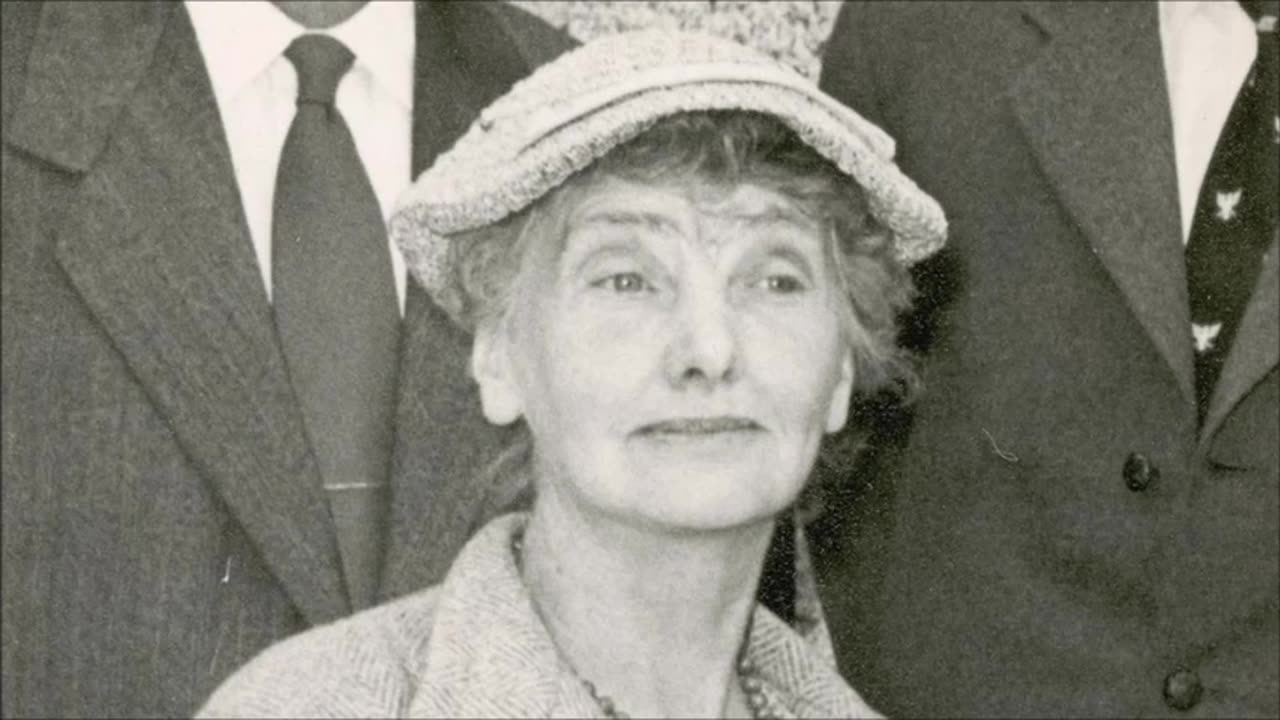Premium Only Content

Dorothy's Prison-Civil War Gaol Journals of Dorothy McArdle 20-04-23
Dorothy's Prison Notebooks-the making of a performance-based on the Civil War Gaol Journals of Dorothy McArdle 20-04-23
This week's Lyric Feature "Dorothy's Prison Notebooks" follows actor Sharon Mcardle and playwright Declan Gorman as they set out to create a theatre piece based on the civil war gaol diaries kept by artist, revolutionary and visionary Dorothy Macardle. Below, Sharon and Declan write about the making of the programme.
The journey began in 2017 when we were invited to perform one of Dorothy's early Abbey plays at a conference of the Dorothy Macardle Society in Dundalk. Neither of us knew much of Dorothy at that point, but that conference set us off on a journey. We decided to find out more about the life, times and legacy of Dundalk-born Dorothy with the view of writing a play about this remarkable woman. Given her multifaceted life, we quickly realised that this would be a challenge. A chance discovery caused us to focus on one brief but remarkable period in Dorothy's life, and embark upon what became a fascinating five year adventure.
Dorothy Macardle was a playwright, historian, Gothic novelist, and international human rights rapporteur. She published several critically acclaimed gothic novels, one of which, The Uninvited, was adapted into a major Hollywood horror film in the 1940s. She was the author of a significant history called The Irish Republic, published in 1937. After the Second World War, Dorothy wrote a human rights report into the plight of minors orphaned and separated as a result of Nazi atrocities in Europe. Daughter of Sir Thomas Macardle, founder of the Macardle Moore brewing enterprise in Dundalk, she rejected her family's imperial values and became - in her own words - "an unrepentant propagandist" on behalf of the Irish Republican cause. During the Civil War, she was imprisoned without trial In November 1922, accused of anti-Treaty propaganda. She spent six months in prison, first at Mountjoy, later at Kilmainham and finally, briefly, at the North Dublin Union.
Not only would it be a challenge to contain such an expansive life in a short dramatic performance but we soon discovered another barrier to accessing Dorothy's personal world. We realised early on in our investigation that many of her papers and manuscripts had been destroyed. Her brother burned her papers after her death in 1958, and her early writings were publicly burned in St. Stephens Green by Free State Soldiers in 1922. But then we were told that one set of papers, a series of diaries kept by Macardle while imprisoned in 1922 and 1923, had escaped the burnings and were now available on microfilm at the James Joyce library in the UCD archives.
Dorothy wrote her secret, scribbled diaries in conditions of poor light and sensory deprivation, recording her personal experience of detention, hunger strikes and beatings while documenting the resilience, political intelligence and humour of her fellow female detainees. Not only do the diaries capture the daily life and politics of the jails in which she was held, but they also offer extraordinary insights into the evolving consciousness, dreams and psychic experiences of an emerging writer of immense gifts whose importance in the shaping of modern Ireland has only recently been acknowledged.y They reveal Dorothy not just as a committed political thinker but a visionary artist whose connection to the uncanny and meditations on time, trauma, and loss place her among the literary innovators of the early 20th century.
The core of our radio documentary is the quest of two living artists to gain an understanding of Dorothy Macardle and bring it to the public in a live, site-specific theatre performance at Kilmainham Gaol.
Dorothy Macardle, who was she? What do her prison diaries reveal about her, her fellow female rebels and detainees, and the politics of the Irish Civil War? How do we, as contemporary artists, deal with fragile matters of memory, legacy and personal testimony? How do we then forge the lyrical and mundane intimacies of a secret diary into a vivid public event that will allow this generation to appreciate the heroism of women so often omitted from narrative of Irish history?
How do we, as artists draw inspiration from archive collections and the historical sites where they are housed, exploring the power of the arts to interrogate and understand history and re-interpret it in imaginative ways?
In our quest as artists back in the rehearsal room, we gain a new perspective on Dorothy Macardle, the imprisoned artist. And that perspective is Dorothy's own: her voice, her own words, her dreams, her own emotions as expressed in her own words: not a third-party interpretation but an empathetic channelling of the spirit of Dorothy Macardle herself. That, we hope, will provide a fresh perspective on Irish history.
-
 1:10:55
1:10:55
Donald Trump Jr.
12 hours agoBREAKING NEWS: My Father Revokes Biden-Maduro Oil License, LIVE with Maria Corina Machado | Triggered Ep.220
203K196 -
 1:25:29
1:25:29
Sarah Westall
10 hours agoX-Files True History, Project Blue Beam, Cabal Faction War w/ Former FBI Agent John DeSouza
84.5K16 -
 7:03:49
7:03:49
Dr Disrespect
17 hours ago🔴LIVE - DR DISRESPECT - NEW PC VS. DELTA FORCE - MAX SETTINGS
170K27 -
 49:04
49:04
Lights, Camera, Barstool
1 day agoIs The Monkey The Worst Movie Of The Year?? + Amazon Gets Bond
75.1K4 -
 24:19
24:19
Adam Carolla
1 day agoDiddy’s Legal Drama Escalates, Smuggler Caught Hiding WHAT? + Philly Eagles & The White House #news
135K20 -
 10:12
10:12
Mike Rowe
2 days agoClint Hill: What A Man. What A Life. | The Way I Heard It with Mike Rowe
130K17 -
 1:31:52
1:31:52
Redacted News
13 hours agoBOMBSHELL! This is war! FBI whistleblowers reveal Epstein files being destroyed? | Redacted News
199K383 -
 48:55
48:55
Candace Show Podcast
13 hours agoSTOP EVERYTHING. They FINALLY Mentioned ME In The Blake Lively Lawsuit! | Candace Ep 152
171K134 -
 1:02:51
1:02:51
In The Litter Box w/ Jewels & Catturd
1 day agoWhere are the Epstein Files? | In the Litter Box w/ Jewels & Catturd – Ep. 750 – 2/26/2025
117K91 -
 1:59:06
1:59:06
Revenge of the Cis
15 hours agoLocals Episode 198: Suits
96.8K16